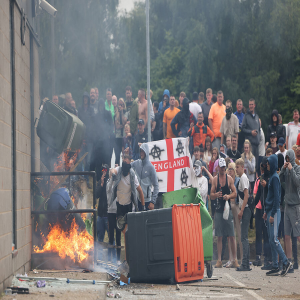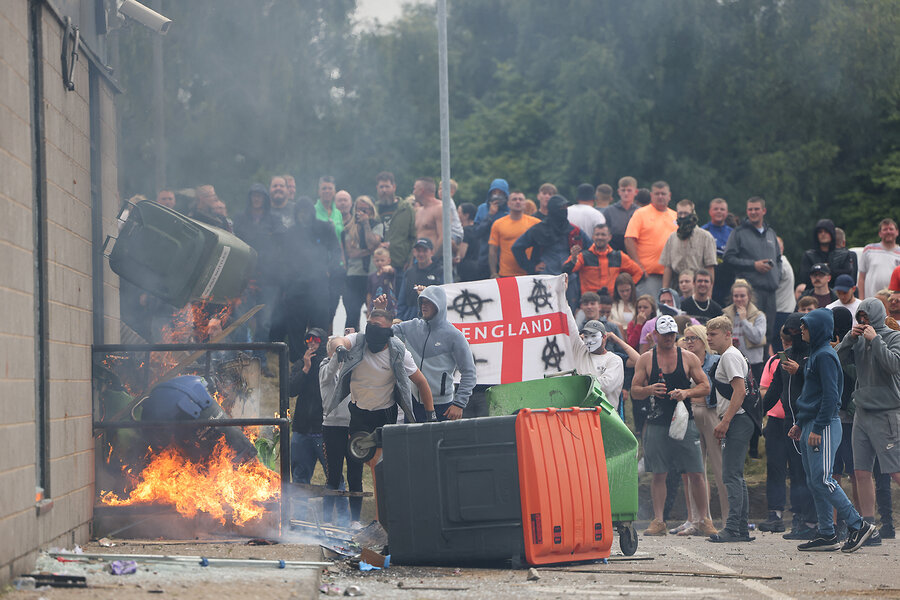
.png) Ram Puniyani
Ram Puniyani

In July 2024, England witnessed riots and unrest in several cities. They were precipitated mainly due to misinformation and anti-immigration sentiments among the people. In these riots, Muslims were the primary target. There were attacks on mosques and also places where immigrants were living. In the aftermath, the 'All-Party Parliamentary Group' of the UK came up with a report to prevent such violence. This group mandated that the phrase 'Muslims spread Islam by the sword' be banned. 'Islam Spread by Sword' is one of the roots of Islamophobia.
This is a great example to emulate in our country, where this and many other misconceptions and biases rule the roost. How did Islam spread? By citing examples of some Hindu kings being killed by Muslim kings for political reasons, a myth has been popularised that Islam spread by sword. Though true in other parts of the world, the reality of the spread of Islam in India is very different.
Arab traders frequently came to the Malabar Coast of Kerala, and the locals adopted Islam through social interaction with these traders. This phenomenon manifests in the Cheraman Jumma Mosque, built in the seventh century in the Malabar region of Kerala.
Swami Vivekananda points out, "The Mohammedan conquest of India came as a salvation of the downtrodden, to the poor. That is why one-fifth of our people have become Mohammedans. It was not the sword that did it all. It would be the height of madness to think that it was all the work of sword and fire. It was to gain their liberty from the… zamindars (landlords) and from the priest, and as a consequence you find in Bengal there are more Mohammedans than Hindus amongst cultivators because there were so many zamindars there." As such, none of the kings spread their religion, barring Emperor Ashok, who sent his emissaries to spread the message of Gautama Buddha.
Today, in India, misconceptions against Muslims and Christians abound and form the base of violence. The misconceptions have become stronger over time and have become a part of 'social common sense.' The process of spreading misconception began with the formulation that Muslim kings destroyed Hindu temples. The intensification of the propaganda led to the demolition of Babri mosque on December 6, 1992, the guilty of which have not been punished to date. Kashi and Mathura have been added to the Babri Mosque issue. Even the Taj Mahal is being propagated as a Shiva Temple converted into the tomb of Noorjahan, queen of Jahangir.
Lately, misconceptions about "cow being a holy animal" and "Muslims are killing the cows" are at the forefront. This is one of the chief grounds for propagating vegetarianism on the one hand and lynching on the other. As per IndiaSpend, "Muslims were the target of 51% of violence centered on bovine issues from 2010 to 2017 and comprised 86% of the 28 Indian citizens killed in 63 incidents. Only 3% of these attacks had been reported before Prime Minister Narendra Modi's government came to power in May 2014." IndiaSpend also recorded that "about half the cow-related violence—32 of 63 cases—occurred in BJP-ruled States."
Human rights activist Harsh Mander, the founder of Karwan-e-Mohabbat, visits the families of lynching victims to soothe the wounds of the families and residents. The impact of lynching is potent and frightening. All this came to mind when Cow Vigilantes killed a Hindu student, Aryan Mishra, on suspicion of cow smuggling. In her statement, Aryan's mother questioned the reasons behind the killing, saying, "The accused mistook him as a Muslim and killed him. Why? Aren't Muslims human? Why do you need to kill Muslims." We recall Akhlaq, Junaid, Rakbar Khan and many others who have been murdered on suspicion of killing cows.
Recently, while travelling by road from Amritsar to Palampur, my young colleague was repeatedly shocked to see the plight of stray cows, their menace on the road, the frequency of road accidents related to cows, and the plight of farmers due to stray cows.
On parallel lines, the non-vegetarian food in the tiffin is becoming another cause for tormenting Muslim students. In an incident, a third-standard Muslim boy in a prominent school in Amroha had brought Biryani in his lunch box. The principal of Hilton School, Amrish Kumar Sharma, locked him up in the store room, commenting, "I won't teach children who will demolish temples after growing up..."
Hate speech is a major problem being faced by the country. We have mechanisms to control and punish those indulging in hate speech, but on the ground, those indulging in hate speech are generally enjoying impunity; rather, they are promoted in the party hierarchy. The Assam Chief Minister spews hate regularly like I will not let Miya Muslims take over Assam. And uses words like flood, electricity, and naukari (job) jihad.
UP Chief Minister Yogi Adityanath began demolishing the houses and property of Muslims using bulldozers. Other BJP Chief Ministers have been following this example. On Bulldozer menace, Justice BR Gavai stated, "How can homes of people be demolished only because he is an accused? Even if he is a convict, it can't be done without following the procedure as prescribed by law." He was hearing a petition against the Jahangirpuri demolition drive in Delhi after the 2022 riots. But the question is, will the Chief Ministers listen?
Is it not time for the state to set up a committee like the one in the UK to ensure the implementation of norms that combat misconceptions? Though many prevailing misconceptions exist in India, no impactful effort has been undertaken to counter them. These misconceptions have spread very dangerously in society. Civil society groups and political parties committed to an inclusive, peaceful society need to come forward to promote harmony by countering misconceptions; it is already long overdue!